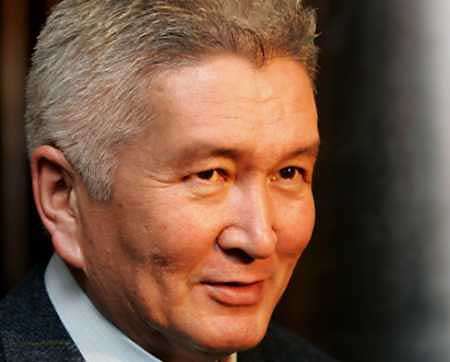
KULOV CONTINUES TO ADVOCATE RUSSIAN-KYRGYZ CONFEDERATION
Publication: Eurasia Daily Monitor Volume: 4 Issue: 130
By:

On July 2 opposition leader and former prime minister Felix Kulov asked the Kyrgyz the Central Election Commission to organize a national referendum on the issue of a Kyrgyz- Russian confederation. This initiative comes a month after Kulov announced his proposal to create a new entity similar to existing Russia-Belarus union.
Kulov’s proposal was received with great skepticism both in Kyrgyzstan and Russia. But while it is currently unpopular, the suggestion comes amid mounting public discontent with the U.S. military base in Bishkek, the Kyrgyz capital. Also, the proposal precedes the Shanghai Cooperation Organization (SCO) summit in August. Over the past few weeks, the Kyrgyz government’s preparations for the SCO summit have been accompanied by various attempts to curb the U.S. presence in the country. The most recent development is that Kyrgyz flight operations officers at Manas airport refuse to handle U.S. airplanes.
To date, Kulov does not have any official political backing either from Russia or Kyrgyzstan. His offer has given him a new platform after his April political fiasco when he failed to force President Kurmanbek Bakiyev to leave office. If the referendum fails, Kulov risks losing his last supporters. Nevertheless his idea has already pushed the limits of pro-Russian views among political circles in Kyrgyzstan. But if Kulov manages to convince the Kyrgyz public, as well as the Russian government, that a confederation is possible or necessary, he will gain considerable support both domestically and in Moscow.
Although many in Kyrgyzstan find Kulov’s idea absurd, most Kyrgyz citizens agree that today Russia is the country’s key strategic partner. Support for greater integration with Russia is noticeable across all generations and occupations. “The mentality is the same,” says a 35-year old Kyrgyz entrepreneur whose business is connected to China. Some believe that while the U.S. presence in Kyrgyzstan is temporary, links with Russia are historical and therefore more stable. “Russia is the only force to prevent the total absorption of Kyrgyzstan by China in the future,” commented a university professor from Bishkek.
On various occasions Parliament Speaker Marat Sultanov has mentioned the need to return Russian border guards to Kyrgyzstan in order to increase control over Kyrgyzstan’s frontiers. According to Sultanov, Kyrgyzstan is not capable of guarding its own borders effectively. Sultanov’s predecessor, Mukar Cholponbayev, blames former president Askar Akayev for failing to seize the opportunity and establish close relations with Russia in the late 1990s.
Kulov chose such a pro-Russian line primarily to increase his own political standing. Along among the Central Asian states, Kyrgyz political officials seek power by subordinating their country to Russia rather than promoting national sovereignty. For example, Kazakhstan and Tajikistan, both with strong Russian political and economic influence, maintain a fundamentally different approach toward Russia. While acknowledging the importance of links with Russia, the governments of both states emphasize their country’s ethnic identity and sovereignty.
Kulov appeals to patriotic feelings to promote his idea. He suggests that Kyrgyzstan would solve its most pressing problems by joining Russia, including the north-south divide and economic underdevelopment. Kulov also brings in historical arguments of Kyrgyz-Russian 150-years of diplomatic relations. Other politicians used similar techniques to campaign against the World Bank’s Heavily Indebted Poor Countries Initiative and to provoke public anger against the shooting of a Kyrgyz citizen by a U.S. airman in December 2006.
Kyrgyz and Russian media quickly picked up Kulov’s proposal. Meanwhile, on June 29 a Kyrgyz citizen was killed in the suburbs of Moscow, but this case has received only marginal coverage in the Kyrgyz press. In general the Kyrgyz mass media overlook the numerous other instances when Kyrgyz migrants are abused or murdered abroad. As one Kyrgyz NGO leader points out, “The brutal killing of a Tajik girl by members of a skinhead movement in winter 2004 in St Petersburg was met with ignorance in Kyrgyz society, as if it doesn’t concern anyone.”
Other international issues with a direct impact on Kyrgyzstan and Central Asia receive scant attention as well. For example, the EU’s increased interest in the South Caucasus and Central Asian region was only marginally discussed in both Kyrgyz political circles and media. Russia and China-led military maneuvers receive by far better media coverage. Few people in Kyrgyzstan are informed on the West’s involvement in sectors such as security, environment, and education.
(Akipress, Bely Parohod, Argumenty i fakty, July 1-5)




